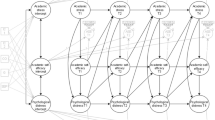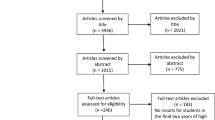Abstract
Research has suggested that academic stress may “spillover” into other life domains and have negative psychological or social consequences for children and adolescents outside of school settings, but relatively few investigations have examined mediators and moderators of spillover. The current study explored the mediating role of state affect and the moderating roles of prior academic performance and mood disturbances on spillover in a sample of 131 French adolescents. Participants completed clinical measures of anxiety and depression and participated in a 7-day ambulatory monitoring phase that involved multiple daily assessments of mood, behaviors, and activities. Spillover was observed for family events and subsequent school-related events, as well as between family and leisure events. These associations remained significant when controlling for immediate mood responses, suggesting that state affect does not play a salient mediating role. There was no evidence that spillover was moderated by academic difficulty, anxiety, depression, or gender. Results are discussed in terms of the role that emotional processes may play in spillover phenomena as well as the reciprocal influence that academic and non-academic events may exert each other.
Similar content being viewed by others
References
Almeida, D. M. (2005). Resilience and vulnerability to daily stressors assessed via diary methods. Current Directions in Psychological Science, 14, 64–68.
Beck, A. T., Ward, C. M., Mendelson, M., Mock, J. E., & Erbaugh, J. K. (1961). An inventory for measuring depression. Archives of General Psychiatry, 4, 561–571.
Blechman, E. A., McEnroe, M. J., Carella, E. T., & Audette, D. P. (1986). Childhood competence and depression. Journal of Abnormal Psychology, 95, 223–227.
Buhs, E. S., & Ladd, G. W. (2001). Peer rejection in kindergarten as an antecedent of young children’s social adjustment: an examination of mediating processes. Developmental Psychology, 37, 550–560.
Buhs, E. S., Ladd, G. W., & Herald, S. L. (2006). Peer exclusion and victimization: processes that mediate the relation between peer group rejection and children’s classroom engagement and achievement? Journal of Educational Psychology, 98, 1–13.
Bursuck, W. (1989). A comparison of students with learning disabilities to low achieving and higher achieving students on three dimensions of social competence. Journal of Learning Disabilities, 22, 188–194.
DuBois, D. L., Eitel, S. K., & Felner, R. D. (1994). Effects of family environment and parent–child relationships on school adjustment during the transition to early adolescence. Journal of Marriage and the Family, 56, 405–414.
Eccles, J. P. (1983). Expectancies, values, and academic behaviors. In J. T. Spence (Ed.), Achievement and achievement motives (pp. 75–146). San Francisco: W.H. Freeman.
Eccles, J., Midgley, C., Wigfield, A., Buchanan, C., Reuman, D., Flanagan, C., et al. (1993). Development during adolescence: the impact of stage-environment fit on young adolescents’ experiences in schools and families. The American Psychologist, 48, 90–101.
Flook, L., & Fuligni, A. J. (2008). Family and school spillover in adolescents’ daily lives. Child Development, 79, 776–787.
Flook, L., Repetti, R. L., & Ullman, J. B. (2005). Classroom social experiences as predictors of academic performance. Developmental Psychology, 41, 319–327.
Franche, R.-L., Williams, A., Ibrahim, S., Grace, S. L., Mustard, C., Minore, B., et al. (2006). Path analysis of work conditions and work–family spillover as modifiable workplace factors associated with depressive symptomatology. Stress and Health, 22, 91–103.
Goodman, W. B., & Crouter, A. C. (2009). Longitudinal associations between maternal work stress, negative work–family spillover, and depressive symptoms. Family Relations, 58, 245–258.
Hankin, B. L. (2008). Rumination and depression in adolescence: investigating symptom specificity in a mulitwave prospective study. Journal of Clinical Child and Adolescent Psychology, 37, 701–713.
Harter, S. (1992). The relationship between perceived competence, affect, and motivational orientation within the classroom: Processes and patterns of change. In A. K. Boggiano & T. S. Pittman (Eds.), Achievement and motivation: a social-developmental perspective (pp. 77–114). New York: Cambridge University Press.
Johnson, J. G., & Sherman, M. F. (1997). Daily hassles mediate the relationship between major life events and psychiatric symptomatology: longitudinal findings from an adolescent sample. Journal of Social and Clinical Psychology, 16, 389–404.
Kendler, K. S., Thornton, L. M., & Gardner, C. O. (2000). Stressful life events and previous episodes in the etiology of major depression in women: an evaluation of the ‘Kindling’ hypothesis. The American Journal of Psychiatry, 157, 1243–1251.
Kovacs, M., & Beck, A. T. (1977). An empirical clinical approach towards a definition of childhood depression. In J. G. Schultebrant & A. Raskin (Eds.), Depression in Children (pp. 1–25). New York: Raven.
Ladd, G. W., Birch, S. H., & Buhs, E. S. (1999). Children’s social and scholastic lives in kindergarten: related spheres of influence? Child Development, 70, 1373–1400.
Lang, P. J., & McTeague, L. M. (2009). Three anxiety disorder spectrum: fear imagery, physiological reactivity, and differential diagnosis. Anxiety, Stress, and Coping, 22, 5–25.
Larsen, R. J., & Diener, E. (1992). Promises and problems with the circumplex model of emotion. In M. S. Clark (Ed.), Review of personality and social psychology (pp. 25–59). Newbury Park: Sage.
Laursen, B., & Collins, W. A. (2009). Parent–child relationships during adolescence. In R. M. Lerner & L. Steinberg (Eds.), Handbook of adolescent psychology (3rd ed., pp. 3–42). Hoboken: Wiley.
Laursen, B., Coy, K. C., & Collins, W. A. (1998). Reconsidering changes in parent–child conflict across adolescence: a meta-analysis. Child Development, 69, 817–832.
Lehman, B. J., & Repetti, R. L. (2007). Bad days don’t end when the school bell rings: the lingering effects of negative school events on children’s mood, self-esteem, and perceptions of parent–child interaction. Social Development, 16, 596–618.
Mazure, C. M. (1998). Life stressors as risk factors in depression. Clinical Psychology: Science and Practice, 5, 291–313.
Midgley, C., Berman, E., & Hicks, L. (1995). Differences between elementary and middle school teachers and students: a goal theory approach. Journal of Early Adolescence, 15, 90–113.
Moor, L., & Mack, C. (1982). Version française d’échelles d’évaluation de la dépression. Echelles de Birleson et de Posnanski (CDRS-R). Neuropsychiatrie de l’Enfance et de l’Adolescence, 30, 623–626.
O’Neill, S. C., Cohen, L. H., Tolpin, L. H., & Gunthert, K. C. (2004). Affective reactivity to daily interpersonal stressors as a prospective predictor of depressive symptoms. Journal of Social and Clinical Psychology, 23, 172–194.
Phillips, D. A., & Zimmerman, M. (1990). The developmental course of perceived competence and incompetence among competent children. In R. Sternberg & J. Kolligian (Eds.), Competence considered (pp. 41–66). New Haven: Yale University Press.
Raudenbush, S., Bryk, A., Congdon, R. (2005). HLM for Windows, version 6.03. Chicago: Scientific Software International.
Repetti, R. L. (1996). The effects of perceived daily social and academic failure experiences on school-age children’s subsequent interactions with parents. Child Development, 67, 1467–1482.
Sloan, D., Strauss, M., & Wisner, K. (2001). Diminished response to pleasant stimuli by depressed women. Journal of Abnormal Psychology, 110, 488–493.
Spielberger, C. D. (1973). State trait anxiety inventory for children: Preliminary manual. Palo
Vandell, D. L., & Hembree, S. E. (1994). Peer social status and friendship: independent contributors to children’s social and academic adjustment. Merrill-Palmer Quarterly, Alto, CA: Consulting Psychologists Press, 40, 461–470.
Vila, G., Nollet-Clémençon, C., de Blic, J., Falissard, B., Mouren-Simeoni, M. C., & Sceinmann, P. (1999). Assessment of anxiety disorders in asthmatic children. Psychosomatics, 40, 404–413.
Weisz, J. R., Weiss, B., Wasserman, A. A., & Rintoul, B. (1987). Control-related beliefs and depression among clinic-referred children and adolescents. Journal of Abnormal Psychology, 96, 58–63.
Welsh, M., Parke, R. D., Widaman, K., & O’Neil, R. (2004). Linkages between children’s social and academic competence: a longitudinal analysis. Journal of School Psychology, 39, 463–482.
Wentzel, K. R. (1991). Social competence at school: relation between social responsibility and academic achievement. Review of Educational Research, 61, 1–24.
Wentzel, K. R., Barry, C. M., & Caldwell, K. A. (2004). Friendships in middle school: influences on motivation and school adjustment. Journal of Educational Psychology, 96, 195–203.
Zautra, A. J. (2003). Emotions, stress, and health. New York: Oxford University Press.
Zautra, A. J., Guarnaccia, C. A., & Doherenwend, B. P. (1986). Measuring small life events. American Journal of Community Psychology, 14, 629–655.
Author information
Authors and Affiliations
Corresponding author
Additional information
Reda Salamon. Postdoctoral fellow at the French National Center for Scientific Research, Bordeaux.
Current themes of research:
Behaviors and experiences of children in academic difficulty.
Most relevant publications in the field of Psychology of Education:
Salamon, R., Johnson, I. E., Grondin, O., Swendsen, J. (2009). Etude des problèmes comportementaux et émotionnels chez l’adolescent: faisabilité et validité de l’approche ESM. Journal de Thérapie Comportementale et Cognitive, 19, 41–46.
Elizabeth I. Johnson. Assistant Professor at the University of Tennessee, Knoxville.
Current themes of research:
Child welfare issues. Parental incarceration. Ambulatory monitoring.
Most relevant publications in the field of Psychology of Education:
Johnson, E. I., & Waldfogel, J. (2004). Children of incarcerated parents: Multiple risk and children’s living arrangements. In M. Pattillo, D. Weiman, & B. Western (Eds.), Imprisoning America: The social effects of mass incarceration (pp. 97–131). New York: Russell Sage Foundation.
Johnson, E. I., (2006). Youth with incarcerated parents: An introduction to the issues. The Prevention Researcher, 13, 3–7.
Berger, L., Bruch, S. K., Johnson, E. I., James, S., & Rubin, D. (2009). Estimating the “impact” of out-of-home placement on child well-being: Approaching the problem of selection bias. Child Development, 80, 1856–1876.
Johnson, E. I., Grondin, O., Barrault, M., Faytout, M., Helbig, S., Husky, M., Granholm, E. L., Loh, C., Nadeau, L., Wittchen, H. U., Swendsen, J. (2009). Computerized ambulatory monitoring in psychiatry: a multi-site collaborative study of acceptability, compliance, and reactivity. International Journal of Methods in Psychiatric Research, 18, 48–57.
Joel Swendsen. Director of Research at the French National Center for Scientific Research, Bordeaux. E-mail: Joel.Swendsen@u-bordeaux2.fr
Current themes of research:
Psychiatric epidemiology. Computerized ambulatory monitoring.
Most relevant publications in the field of Psychology of Education:
Merikangas, K. R., He, J. P., Burstein, M., Swanson, S. A., Avenevoli, S., Cui, L., Benjet, C., Georgiades, K., Swendsen, J. (2010). Lifetime prevalence of mental disorders in U.S. adolescents: results from the National Comorbidity Survey Replication--Adolescent Supplement (NCS-A) J Am Acad Child Adolesc Psychiatry, 49, 975–976.
Swendsen, J., Conway, K. P., Degenhardt, L., Dierker, L., Glantz, M., Jin, R., Merikangas, K. R., Sampson, N., Kessler, R. C. (2009). Sociodemographic risk factors for alcohol and drug dependence: The 10-year follow-up of the national comorbidity survey. Addiction, 104, 1346–1355.
Rights and permissions
About this article
Cite this article
Salamon, R., Johnson, E.I. & Swendsen, J. Daily life mechanisms of stress spillover among early adolescents experiencing academic difficulty. Eur J Psychol Educ 26, 453–463 (2011). https://doi.org/10.1007/s10212-011-0056-7
Received:
Revised:
Accepted:
Published:
Issue Date:
DOI: https://doi.org/10.1007/s10212-011-0056-7




